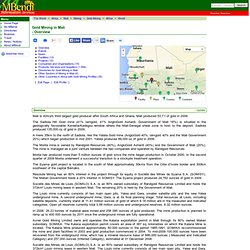

Understanding the Standoff in Mali. The standoff between Mali’s government and the armed Islamists who control two-thirds of the country is unlikely to resolve peacefully, and the prospects for a new war in the Sahel appear increasingly probable.
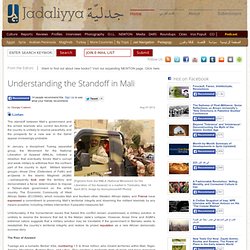
In January, a disciplined Tuareg separatist group, the Movement for the National Liberation of Azawad (MNLA), initiated a rebellion that eventually forced Mali’s corrupt and weak military to withdraw from the northern part of the country in April. Militant Islamist groups—Ansar Dine (Defenders of Faith) and al-Qaeda in the Islamic Maghreb (AQIM)—subsequently took over the territory and demonstrated a fierce determination to impose a Taliban-style government on the entire country.
Unfortunately, if the humanitarian issues that fueled this conflict remain unaddressed, a military solution is unlikely to resolve the tensions that led to the Malian state’s collapse. Is Mali's conflict a threat to the region? - Inside Story. Tensions have risen in northern Mali after al-Qaeda-linked fighters seized control of an area where the Tuareg National Movement for the Liberation of Azawad (MNLA) recently declared an independent state.

But just what does this mean for the region and is a military intervention by regional powers an option? Mali: how bad can it get? – A conversation with Isaie Dougnon, Bruce Hall, Baz Lecocq, Gregory Mann and Bruce Whitehouse. After the coup: a long road back for Mali.

Edited by Baz Lecocq and Gregory Mann, from a conversation on 3 April 2012. From dusk till late evening, you can find small groups of young people sitting on street corners, in front of houses, or in courtyards across West Africa. There will inevitably be a little radio, playing music and broadcasting news. The ‘junior’ of the group is busy brewing and passing round small glasses of tea, while the others hang out, play cards, and discuss the news they hear, whether it comes from Radio France Internationale or sidewalk radio.
In Mali, such a group is called a grin. The news is bad On 22 March, a military putsch chased President Amadou Toumani Touré from power, mere weeks before the end of his final mandate. Our contributors Isaie Dougnon (ID) lectures Anthropology and Sociology at the University of Bamako. Bruce Hall (BH) lectures African history at Duke University. Baz Lecocq (BL) lectures African history at Gent University.
France in Mali: The longue dur e of imperial blowback - Opinion. Mali: War Crimes by Northern Rebels. (Bamako) – Separatist Tuareg rebels, Islamist armed groups, and Arab militias who seized control of northern Mali in April 2012 have committed numerous war crimes, including rape, use of child soldiers, and pillaging of hospitals, schools, aid agencies, and government buildings, Human Rights Watch said today.
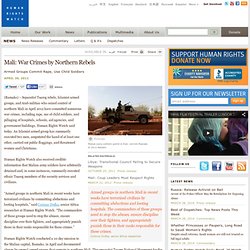
An Islamist armed group has summarily executed two men, amputated the hand of at least one other, carried out public floggings, and threatened women and Christians. Human Rights Watch also received credible information that Malian army soldiers have arbitrarily detained and, in some instances, summarily executed ethnic Tuareg members of the security services and civilians. “Armed groups in northern Mali in recent weeks have terrorized civilians by committing abductions and looting hospitals,” said Corinne Dufka, senior Africa researcher at Human Rights Watch. These and other armed groups undertook operations in January 2012 when the MNLA launched their bid for a separatist state.
A silent crisis in Northern Mali as food shortages worsened by political stalemate – By Celeste Hicks. Food is distributed in Northern Mali.
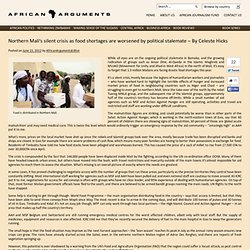
While all eyes are on the ongoing political stalemate in Bamako, and the growing radicalism of groups such as Ansar Dine, Al-Qaeda in the Islamic Maghreb and MUJAO (Movement for Unity and Jihad in West Africa) in the north of Mali, it’s easy to forget that 1.3 million Malians are facing drastic food shortages this year. It’s a silent crisis, mostly because the legions of humanitarian workers and journalists – who have worked hard to highlight the terrible effects of hunger and increased market prices of food in neighbouring countries such as Niger and Chad – are struggling to even get to northern Mali. Mali’s struggle: not simply of their own making. In examining the political crises which have gripped Mali in recent months, it is important not to fall into simplistic analyses of dysfunctional or “failed” African states.

Indeed, the Malian people have repeatedly demonstrated their ability to mobilize civil society and build stable democratic governance despite a history of enormous poverty, ethnic divisions, and foreign intervention. In 1991, more than two decades prior to similar pro-democracy uprisings in Tunisia and Egypt, Malians engaged in a massive nonviolent resistance campaign that brought down the dictatorship of Mousa Traoré. A broad mobilization of trade unionists, peasants, students, teachers, and others – supported by griots (traditional singing storytellers) who would sing allegorical songs regarding historical freedom struggles – created a mass movement throughout the country. The Lesson from Mali: Do No Harm - By Christian Caryl. I realize that most Americans or Europeans wouldn't be able to pick out Mali on a map.
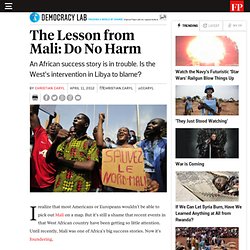
But it's still a shame that recent events in that West African country have been getting so little attention. Until recently, Mali was one of Africa's big success stories. Now it's foundering. This is especially ironic when you consider that it may be the policies of the West -- well-intentioned policies that were aimed at ridding the world of a specific evil -- that have contributed to Mali's troubles. Mischief On Mali—and the Amazigh. Mali is so obscure to the Western world that if you google the name of its president, Amadou Toumani Touré, you only get 202,000 entries, about the same as a mid-level well known American.

The country has been afflicted by a civil war for long stretches of the past few decades, most notably from 1990 to 1996, but no one in the US has much noticed. Coverage of the political situation is particularly lacking. So I have been reading Roger Kaplan’s dispatches from Mali for the Weekly Standard, most notably a feature in the current issue, with great attention. As a French speaker with long experience in Africa, Kaplan comes with some credentials. And my knowledge of Mali is fragmentary and way out of date—I was first and last there in 1989.
Unfortunately, Kaplan’s piece “Mischief in Mali” seems more likely to perpetuate American ignorance of what is going on in this part of the world than to dispel it.
Gold Mining in Mali. Mali is Africa's third largest gold producer after South Africa and Ghana.
